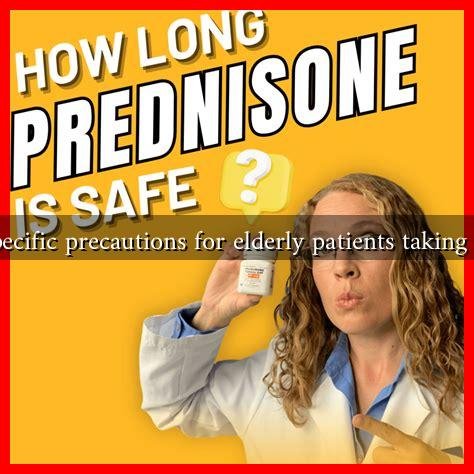-
Table of Contents
Are There Specific Precautions for Elderly Patients Taking Prednisone?
Prednisone is a corticosteroid medication commonly prescribed to treat a variety of conditions, including autoimmune diseases, allergies, and inflammatory disorders. While it can be highly effective, elderly patients often face unique challenges and risks when taking this medication. Understanding these precautions is crucial for ensuring safe and effective treatment.
Understanding Prednisone and Its Effects
Prednisone works by suppressing the immune system and reducing inflammation. While it can provide significant relief from symptoms, it also comes with a range of potential side effects, particularly in older adults. The elderly population is more susceptible to these side effects due to age-related physiological changes and the presence of comorbidities.
Common Side Effects of Prednisone in the Elderly
Some of the most common side effects of prednisone that may be exacerbated in elderly patients include:
- Increased Risk of Infections: Prednisone suppresses the immune system, making elderly patients more vulnerable to infections.
- Bone Density Loss: Long-term use can lead to osteoporosis, increasing the risk of fractures.
- Gastrointestinal Issues: Elderly patients may experience stomach ulcers or gastrointestinal bleeding.
- Cardiovascular Effects: Prednisone can lead to hypertension and fluid retention, which are particularly concerning for older adults with heart conditions.
- Mood Changes: Elderly patients may experience mood swings, anxiety, or depression as a side effect of corticosteroids.
Precautions for Elderly Patients on Prednisone
Given the potential risks, it is essential for healthcare providers and caregivers to take specific precautions when prescribing prednisone to elderly patients. Here are some key considerations:
- Regular Monitoring: Frequent check-ups are necessary to monitor blood pressure, blood sugar levels, and signs of infection.
- Bone Health Assessment: Consider prescribing calcium and vitamin D supplements to mitigate the risk of osteoporosis.
- Gastroprotective Agents: Co-prescribing medications like proton pump inhibitors can help protect against gastrointestinal side effects.
- Gradual Tapering: If discontinuing prednisone, a gradual tapering schedule is crucial to avoid adrenal insufficiency.
- Patient Education: Educate patients and caregivers about the signs of potential side effects and when to seek medical attention.
Case Studies and Statistics
A study published in the Journal of the American Geriatrics Society found that elderly patients taking corticosteroids like prednisone had a 30% higher risk of hospitalization due to infections compared to those not on these medications. Another case study highlighted an 82-year-old woman who developed severe osteoporosis after long-term prednisone use, resulting in multiple fractures. These examples underscore the importance of careful management and monitoring.
Conclusion
Prednisone can be a lifesaving medication for many elderly patients, but it is not without its risks. The unique physiological changes that occur with aging necessitate specific precautions to ensure safe use. Regular monitoring, patient education, and proactive management of side effects are essential components of care for elderly patients on prednisone. By taking these precautions, healthcare providers can help mitigate risks and enhance the quality of life for their patients.
For more information on the safe use of corticosteroids in elderly patients, consider visiting the National Institutes of Health.

